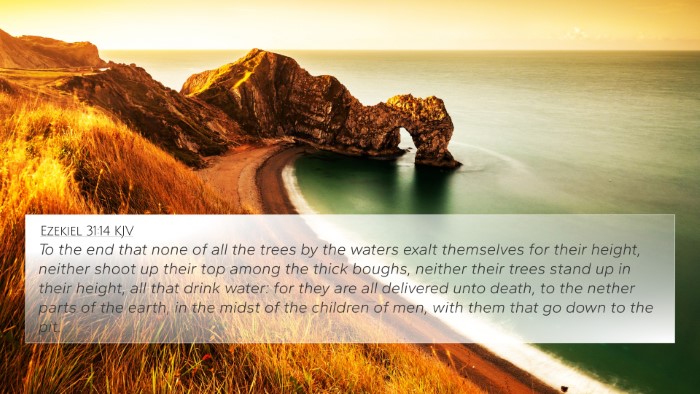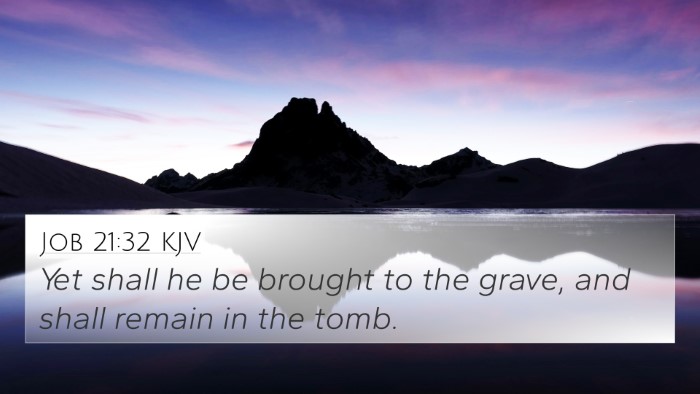Understanding Psalms 82:7
Psalms 82:7 states: "But you shall die like men and fall like one of the princes." This verse is a powerful reminder of the mortality and the divine judgment that await even those in positions of power. The implications of this verse open a discussion about divine authority, justice, and the accountability of earthly rulers.
Contextual Interpretation
The Psalms, often rooted in poetic imagery and emotional expression, addresses profound truths about God's relationship with humanity. This particular Psalm is attributed to Asaph and provides a striking portrayal of God standing in judgment over earthly rulers—often referred to metaphorically as "gods" due to their authority and power.
Commentary Insights
According to Matthew Henry, this verse underscores that all authority is under God's watchful eye. No matter one's status, all must face divine judgment. This emphasizes the theme of accountability inherent in biblical teaching.
Meanwhile, Albert Barnes explains that the metaphor of "dying like men" refers to the mortality that even the greatest leaders cannot escape. The failure of these rulers to uphold justice leads not only to their downfall but illustrates a broader theme of the inevitable fate shared by all humanity.
Adam Clarke draws on the historical implications of this verse, detailing how leaders who stray from divine justice lose their exalted position and are brought low. This serves as a warning and a lesson in humility for those who lord power over others.
Thematic Connections and Cross-References
- Psalm 82:1: "God stands in the congregation of the mighty; He judges among the gods." - This verse highlights God's authority over earthly judges.
- John 10:34-36: Jesus references Psalm 82, indicating that humans can be called "gods" when entrusted with God's word.
- Ecclesiastes 3:19: "For what happens to the sons of men also happens to animals; one thing befalls them: as one dies, so dies the other." - A reflection on the common fate of all living beings.
- Isaiah 14:18-20: Discusses the downfall of the king of Babylon, paralleling the themes of pride and judgment.
- Revelation 20:12: Illustrates the final judgment where all must stand accountable before God.
- James 4:12: "There is one Lawgiver, who is able to save and to destroy. Who are you to judge another?" - A reminder of God's ultimate authority in judgments.
- 1 Peter 2:13-14: Encourages submission to governing authorities, underscoring that rulers are to remain just and accountable to God.
- Lamentations 3:34-36: “To crush under one's feet all the prisoners of the earth, to turn aside the justice due a man…” - God condemns unjust authority and highlights His divine justice.
- Proverbs 29:2: “When the righteous are in authority, the people rejoice; But when a wicked man rules, the people groan.” - Connections between leadership and societal well-being.
- Matthew 23:12: “And whoever exalts himself will be humbled, and he who humbles himself will be exalted.” - The principles of humility and divine retribution.
Connecting Themes in Scripture
Psalms 82:7 is intricately linked with themes of justice, accountability, and the transitory nature of power. It encourages readers to reflect on the significance of righteous leadership and God’s ultimate authority. This verse resonates throughout both the Old and New Testaments, emphasizing God’s unchanging truth regarding justice.
As we explore the connections between these verses, we find a tapestry woven across the Scriptures that speaks to the nature of authority, the importance of justice, and the inevitability of divine judgment.
Application for Today
For modern believers, understanding Psalms 82:7 moves beyond theological insight, prompting one's moral responsibility. It serves as a reminder that leaders must act with integrity and justice, aware of their accountability to a higher authority. By embracing these biblical principles, one engages deeply in their faith and promotes righteousness in their spheres of influence.
Resources for Further Study
To delve deeper into the themes found in Psalms 82:7 and its cross-references, consider utilizing tools for Bible cross-referencing or a Bible concordance. Such resources empower you to explore connections between Bible verses and foster a richer understanding of the biblical text.
Engaging in cross-reference Bible study invites a comprehensive examination of related scriptures, enabling believers to see the thematic unity of the Bible. Through methods of scriptural cross-referencing, one can uncover profound insights about faith, justice, and the nature of God’s authority.






